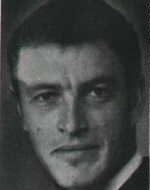Milo (Melnik), Raphael-Menachem (“Rafi”)
Son of Bezalel and Shoshana. He was born in son of Shemen on August 2, 1943. His father was a teacher in son of-Shemen and after his return from the British army he moved with his family to Kfar Yedidya and settled there. He loved the work of the land and all kinds of animals and spent his free time enjoying nature walks, but most of all he loved the sea: Rafael was an excellent sailor and loved to sail to the sea by sailboat. After completing his studies in elementary school, he was accepted to the regional high school in the Hefer Valley, where he continued his activities at sea. When he was 15 years old, when he was commanding a sailboat, one of the apprentices fell ill while sailing, and Raphael jumped into the sea and carried him on his shoulders to the road, and then returned to the sea. In July 1961 and volunteered to serve in the navy, in the naval commando unit. In this unit Rafael found his place. He completed his officers’ course as an outstanding trainee and became one of the pillars of the naval commando unit. Service for him was a mixture of patriotism and love of the sea. At the same time, he found full satisfaction in agricultural work and during his vacations worked in the parents’ farm in Kfar Yedidya. In July 1963 Rafael joined the regular army. At the end of 1968 he married a wife of Atlit, received a one-year vacation and settled in the seaside town. Without help, he began to build his own house, a stone house – but he did not merit to inaugurate it. As a result of the deteriorating security situation, Rafael was called back to the service before the end of his vacation, and on September 8, 1969, he died in the course of his mission, after successfully carrying out his mission – . Raphael was the commander of the attacking force. He was laid to rest in the cemetery in Kfar Yedidya. He left behind a wife. In his eulogy to Major Milo and his colleagues, Minister of Defense Moshe Dayan said: They plant vineyards, but we do not always see Prime. They build houses and sometimes they do not return to them; They are women, but not everyone gets to raise their children, educate them, and be with them. Now, after the Six-Day War, this is the third year they have been deployed on the banks of the Suez, the Golan Heights, the Arava and the Jordan Valley, fighting for the welfare and future of Israel. They are not many, but their power exceeds their number; And when they fall, their younger brethren come to carry their sword and fortify the strongholds of the borders, ready to fight in the sea and under the water, in the air and in the infantry units – clinging to their mission and giving their people a life in their homeland. “Chief of Staff General Haim Bar-Lev wrote to his wife Rafael, condolences: “I saw him on the eve of the operation and his entire appearance ensured the success of the mission. The commander of his unit wrote to his wife and parents: “Rafi’s death is a very serious loss to the flotilla, in which he served in a senior and central position. For many years he served in the unit stood out as the best among the fighters and commanders. His personal qualities and humanity turned him into a concept, until no one in the unit was found who disliked and admired him. His dedication, responsibility and dedication to carrying out tasks led us to lay on his shoulders the hardest of missions, to which he was able to escape with great pleasure, pride and enthusiasm. This wonderful combination of man and warrior, as embodied in the late Rafi, constitutes for us an exemplary figure, in which we are educated and educate our soldiers. These fighters, despite being a handful, are the bedrock of Israel’s security. “Flo held a memorial service in Kfar Yedidya and inaugurated a sports field in his memory; His memory was raised in the books “Suez – Fire on the Water” and “War of Attrition” and articles in the Navy magazine “Sea Systems” and in the weekly “Haolam Hazeh”.
